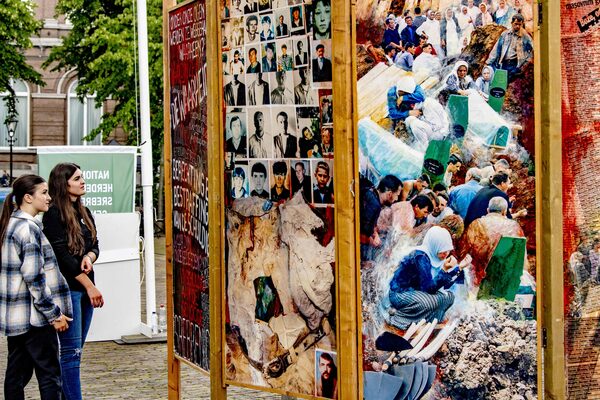
People look at commemorative panels, during the National Remembrance Srebrenica-Genocide, in the Hague, during the 26th anniversary of the Sebrenica massacre on July 11, 2021. During the offensive, more than 8,000 Bosnian non-Serbs went missing to be found buried in mass graves, years after the war ended.ROBIN UTRECHT/AFP/Getty Images
The Bosnian Serb entity in Bosnia decided on Friday to defy the recent decision of the international peace overseer in the Balkan country to ban the denial of the 1995 Srebrenica genocide.
The parliament of the Serb Republic unanimously adopted amendments to its own criminal law aimed against the decree by outgoing High Representative Valentin Inzko and decided not to cooperate with central authorities in its implementation.
Last week, Inzko introduced jail terms for denying or justifying the Srebrenica genocide or war crimes committed during Bosnia’s 1992-95 conflict.
The Bosnian Serb amendments envision jail terms of up to five years for those who “disparage or label the Serb Republic or its people as genocidal or aggressor,” and 15 years for acts against its “constitution, integrity and independence,” the parliament said in a statement.
“The institutions of the Serb Republic will not cooperate with ... bodies of Bosnia and Herzegovina in the implementation of the decision of the High Representative,” it said.
In July 1995, Bosnian Serb forces seized the U.N.-protected enclave of Srebrenica in the country’s east and killed about 8,000 Bosnian Muslim men and boys they took prisoner.
The atrocity was judged an act of genocide by two international courts, something Serb nationalists vehemently deny.
While Bosnian officials hailed Inzko’s move, Serb officials said it could further divide the country.
“He (Inzko) brought the country to the biggest crisis since the end of the war,” the statement quoted Nedeljko Cubrilovic, the Serb republic’s parliament speaker, as saying.
Inzko, whose 12 years in office end on Aug. 1 and who will be replaced by Germany’s Christian Schmidt, can impose laws and fire officials.
His powers stem from the Dayton peace treaty, which ended the war in which 100,000 people died.
The Dayton accord left Bosnia divided between Bosniak-Croat Federation and the Serb Republic, linked by a relatively weak central government and tripartite inter-ethnic presidency.
Our Morning Update and Evening Update newsletters are written by Globe editors, giving you a concise summary of the day’s most important headlines. Sign up today.